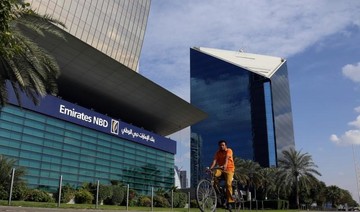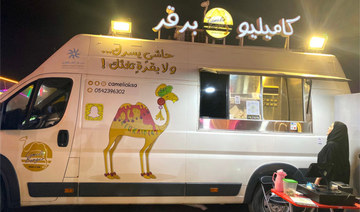RIYADH: In Saudi Arabia’s vast agricultural terrain, a transformative shift is occurring, driven by the adoption of advanced technologies.
Despite challenges such as water scarcity, inefficient practices, and climatic hardships, integrating Internet of Things technologies in farming is bringing a sense of optimism.
This transformative approach promises to revolutionize traditional agricultural practices and offer a path toward a more resilient and prosperous future for Saudi farmers.
In an interview with Arab News, economist and policy adviser Mahmoud Khairy said that improving productivity, resource efficiency, and sustainability in the farming sector are key factors driving the adoption of IoT applications in the Kingdom.
“These technologies enable farmers to monitor and manage their crops and livestock more effectively, leading to better yields and reduced costs,” he said.
Phil Webster, partner at the management consulting firm Arthur D. Little, told Arab News: “There has been significant uptake of these relatively nascent technologies compared to, say, five years ago.”
As the nation embraces IoT solutions, it embarks on a journey toward sustainable agriculture, where productivity, efficiency, and environmental stewardship converge to create a brighter future.
Transforming agricultural practices
The application of IoT in smart farming is revolutionizing traditional agricultural practices. Farmers can gather real-time data on various parameters crucial for crop growth by utilizing sensors, actuators, and connected devices.
Soil moisture, temperature, humidity, livestock health, and crop growth data are collected and analyzed to make informed decisions. This data-driven approach enables farmers to optimize resource usage, improve crop yields, and minimize environmental impact.
Mishkat, a company specializing in sustainable and high-production farming, has highlighted its initiatives, such as vertical farming and impressive greenhouse facilities, which showcase the immense potential of IoT technologies in overcoming challenges.
The company aims to produce nutritious, authentic, and trusted food with minimal environmental impact, prioritizing sustainability, safety, and health.
“We want to be the leading experts in KSA on sustainable and high production farming techniques, delivering high- quality produce with maximum resource efficiency,” Mishkat says.
The firm’s unique fusion of vertical farming with greenhouse cultivation offers a sustainable solution to local pesticide-free and water-efficient production.
Nestled on the outskirts of Jeddah, Mishkat’s agricultural facility combines vertical farming with advanced greenhouse technology to offer a sustainable solution to local pesticide-free and water-efficient production.
This unique fusion of techniques presents a compelling vision for the future of agriculture in arid regions. Their facility includes a vertical farm where crops are grown in stacked layers.
This design, reminiscent of a multi-tiered tower, is more than just visually striking – it’s a smart solution to land scarcity.

These technologies enable farmers to monitor and manage their crops and livestock more effectively, leading to better yields and reduced costs.
Mahmoud Khairy, economist and policy adviser
Complementing the vertical farm, Mishkat boasts two state-of-the-art greenhouses. These structures, armed with advanced climate control systems, provide an optimal environment for plant growth.
By modulating factors like temperature, humidity, and light, greenhouses ensure that the crops inside are shielded from the harsh climatic conditions typical of the Jeddah outskirts.
Mishkat’s headquarters is unique for several reasons: it is among the first commercial vertical farms in the Kingdom, offers rare greenhouse and vertical hybrid agricultural facilities, and is one of the few certified organically controlled environment farms globally.
In Riyadh, Bather Farm is also redefining urban farming with its cutting-edge vertical farming system.
By leveraging Agritecture Designer farm planning software and iFarm technology, Bather Farm optimizes crop production in an otherwise arid environment.
“At Bather Farm, we envision a greener and healthier Saudi Arabia, where agriculture gives to the people and planet more than it takes,” the firm says on its website.
This project underlines CEA’s potential to reinvent regional agriculture, paving the way toward food security and sustainability.
This melding of technology and agriculture underscores the potential for harmonizing urban living with sustainable farming practices.
E-farming boosting the economy
Economist and policy adviser Mahmoud Khairy emphasized the significance of adopting advanced agricultural solutions in Saudi Arabia.
Khairy highlighted that embracing IoT-enabled farming technologies and precision agriculture practices aligns with the nation’s broader economic and agricultural development objectives.
He added: “By embracing these technologies, the country aims to modernize its agricultural sector, create job opportunities, and reduce its dependency on food imports,” stressing that such advancements would bolster food security, diversify the economy, and minimize water usage in agriculture.
Moreover, Khairy pointed out that implementing data-driven approaches to optimize crop yields and resource efficiency could lead to several economic benefits.
By leveraging data analytics, farmers can make more informed decisions, resulting in increased productivity, higher revenues, and improved profitability.

Partnerships and collaborations play a critical role in promoting the adoption and maintenance of digital technologies in agriculture.
Phil Webster, partner at Arthur D. Little
Khairy emphasized that compared to traditional methods, data-driven approaches offer a more precise and scientific way of managing agricultural operations. Therefore, they enhance productivity and resource efficiency while ensuring long-term economic viability and sustainability.
IoT-enabled farming technologies in Saudi Arabia’s agricultural sector play a crucial role in improving productivity and sustainability through precision monitoring and management, resource efficiency, and remote management, according to Khairy.
“These technologies, such as sensors and drones, provide real-time data on soil quality, crop health, and pest infestations, allowing farmers to make informed decisions on irrigation, fertilization, and pest control,” he explained.
Government support and collaboration
For IoT technologies to reach their full potential in Saudi agriculture, government support and collaboration are paramount.
Initiatives like the National Agricultural Development Co.’s AI solutions demonstrate the importance of leveraging technology for agricultural advancement.
By fostering collaboration among stakeholders and providing financial support, policymakers can facilitate the widespread adoption of IoT technologies.
Additionally, investment in research and development, infrastructure, and training programs is essential to equip farmers with the necessary skills and knowledge to embrace IoT solutions effectively.
Moreover, partnerships between government agencies, agricultural extension services, technology providers, and academic institutions can promote knowledge-sharing and innovation in the agricultural sector.
“Partnerships and collaborations play a critical role in promoting the adoption and maintenance of digital technologies in agriculture,” Arthur D. Little’s Webster emphasized.
He added: “The most important role of such collaborations is to ensure that there is good governance over the data that is collected at all parts of the food chain from farm to fork.”
Webster explained that data governance is “clarity over how data – and any associated meta-data – is collected, in what form, and for use by whom (e.g., different parts of the agri-food supply chain, regulators, Government) and under what circumstances.”
He stressed the cruciality of such aspects in ensuring that business models involving the use and monetization of data work effectively.
Webster also called on farmers to take advantage of the Saudi government’s wide range of initiatives and programs to integrate digital technologies.
The General Authority for Statistics has recently launched the inventory survey of agricultural holdings in the Kingdom in order to provide essential data on plant and animal production, including cultivated areas and production quantities, as well as sales volumes, crop values, and livestock numbers at the regional level.
Commenting on the survey, Khairy said: “With this data, policymakers, researchers, and agricultural stakeholders can identify areas for improvement, pinpoint specific challenges faced by farmers, and tailor agriculture solutions to address the unique needs of different regions.”
As Saudi Arabia faces the challenges of water scarcity, climate change, and food security, embracing IoT technologies becomes imperative.
The integration of IoT in agriculture offers a pathway to overcome these challenges, enhance productivity, and promote sustainable farming practices.
Through collaboration, innovation, and government support, Saudi farmers can embark on a journey toward a more resilient and prosperous agricultural future.
“Owing to both demand and investment – as well as the increasing availability of IoT-enabled farming technologies – this future trajectory will no doubt continue,” Webster said.
He suggested that the nation could soon achieve self-sufficiency or become a net exporter, particularly in products like eggs.
Webster envisioned a revolution in agricultural supply chains, emphasizing a transition to alternative proteins with great potential in semi or fully-automated indoor farming, which promises heightened productivity and reduced production costs.
Khairy said that Saudi Arabia’s adoption of advanced farming technologies is “poised to make significant contributions to global food security and environmental conservation efforts.”
He added that through the incorporation of sustainable agricultural practices, farmers in the Kingdom can increase productivity while minimizing environmental impact.
“This not only ensures food security domestically but also allows Saudi Arabia to potentially become a key player in international food supply chains,” Khairy explained.




























